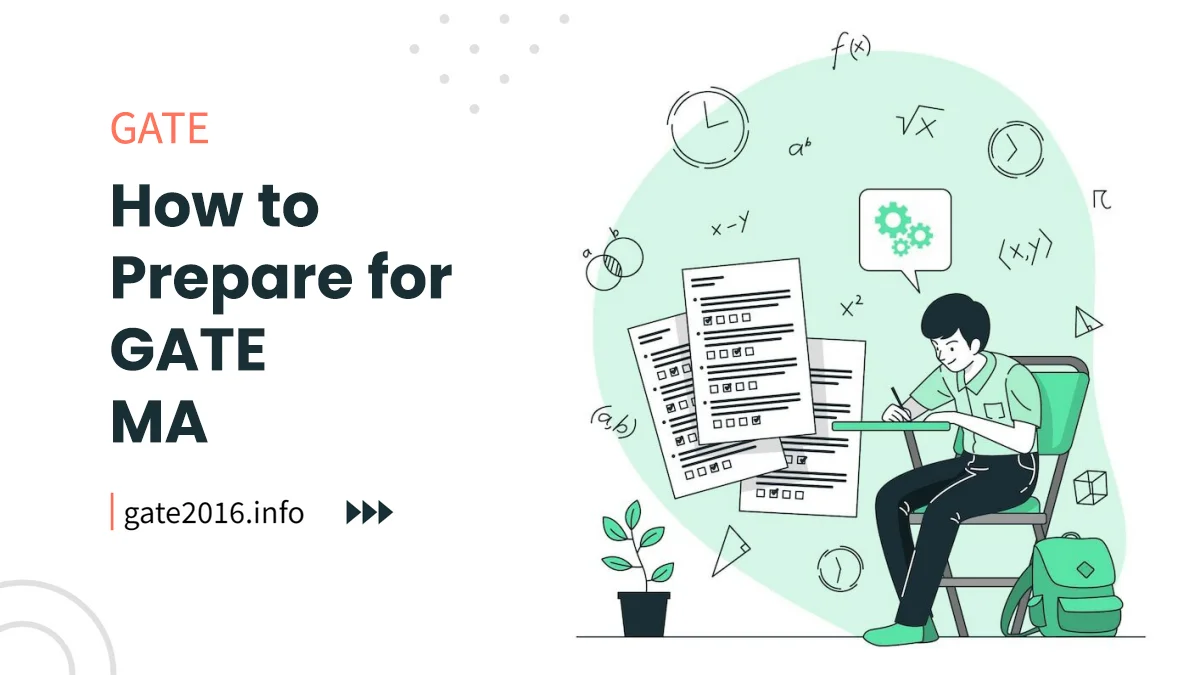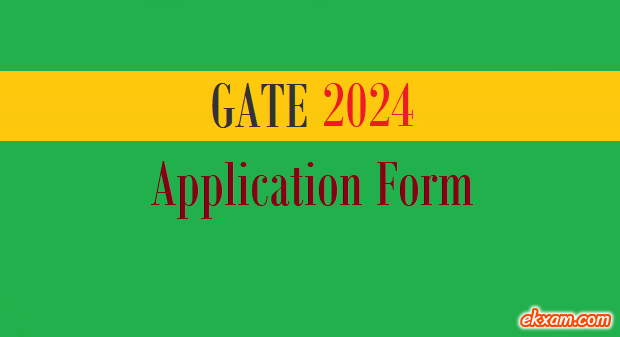Advertisements
Ratings

GATE 2024 MA Preparation – The Graduate Aptitude Test in Engineering (GATE) is a vital examination for aspiring mathematicians.
GATE Mathematics encompasses a wide range of mathematical concepts, and thorough preparation is essential to excel in this exam.
This comprehensive guide provides strategies, tips, and a step-by-step approach to help you prepare effectively and achieve success in the GATE Mathematics exam.
Contents
- 1. Introduction to GATE Mathematics
- 2. Understanding the GATE Mathematics Syllabus
- 3. Developing a Structured Study Plan
- 4. Selection of Relevant Study Materials
- 5. Mastering Fundamental Mathematical Concepts
- 6. Solving Practical Mathematical Problems
- 7. Reviewing Previous Years’ Question Papers
- 8. Taking Mock Tests
- 9. Time Management Strategies
- 10. Implementing Revision Techniques
- 11. Staying Informed with Mathematical Trends
- 12. Managing Exam Stress
- 13. Final Weeks’ Preparation Strategy
- 14. Approaching Exam Day Confidently
- 15. Reflecting on the Exam and Planning Ahead
- Conclusion: Excelling in GATE Mathematics
- Additional Resources and References
- GATE Mathematics Guidance
- GATE Mathematics Preparation FAQs
- GATE Total Information & Guidance
1. Introduction to GATE Mathematics
GATE holds immense significance for those passionate about mathematics.
Not only does it provide a platform to showcase your mathematical prowess, but it also opens doors to advanced studies and research in the field.
2. Understanding the GATE Mathematics Syllabus
A deep understanding of the GATE Mathematics syllabus is fundamental for efficient preparation.
Let’s delve into the syllabus by breaking it down into subjects and key topics:
Table 1: GATE Mathematics Syllabus Breakdown
| Subject | Key Topics |
|---|---|
| Linear Algebra | Vector spaces, Linear transformations, Eigenvalues |
| Complex Analysis | Analytic functions, Residue theorem, Conformal mappings |
| Real Analysis | Sequences, Series, Limits, Continuity |
| Abstract Algebra | Groups, Rings, Fields, Group actions |
| Probability & Statistics | Random variables, Probability distributions |
| Numerical Methods | Interpolation, Numerical integration, Root finding |
3. Developing a Structured Study Plan
Creating a well-structured study plan is paramount.
Organize your plan by allocating time to different subjects and topics based on their weightage and your familiarity with them.
Table 2: Sample Study Plan
| Week | Subjects/Topics | Time Allocation |
|---|---|---|
| 1-2 | Linear Algebra | 10 hours/week |
| 3-4 | Complex Analysis | 12 hours/week |
| 5-6 | Real Analysis | 10 hours/week |
| 7-8 | Abstract Algebra | 12 hours/week |
| 9-10 | Probability & Statistics | 10 hours/week |
| 11-12 | Numerical Methods | 12 hours/week |
4. Selection of Relevant Study Materials
Choosing appropriate study materials is crucial.
Utilize a mix of textbooks, online resources, video lectures, and practice tests for a comprehensive approach.
Table 3: Recommended Study Resources
| Subject | Books | Online Resources |
|---|---|---|
| Linear Algebra | “Linear Algebra” by Gilbert Strang | MIT OpenCourseWare’s Linear Algebra course |
| Complex Analysis | “Complex Analysis” by Elias M. Stein, Rami Shakarchi | NPTEL’s Complex Analysis lectures |
| Real Analysis | “Principles of Mathematical Analysis” by Walter Rudin | Khan Academy’s Real Analysis tutorials |
| Abstract Algebra | “A First Course in Abstract Algebra” by John B. Fraleigh | MathHelp’s Abstract Algebra lessons |
| Probability & Statistics | “Introduction to Probability” by Joseph K. Blitzstein | Coursera’s Probability & Statistics courses |
| Numerical Methods | “Numerical Analysis” by Richard L. Burden, J. Douglas Faires | MIT OpenCourseWare’s Numerical Methods course |
5. Mastering Fundamental Mathematical Concepts
Developing a strong foundation in core mathematical concepts is essential. Concentrate on fundamental principles within each subject:
Table 4: Mastering Fundamental Concepts
| Subject | Key Concepts |
|---|---|
| Linear Algebra | Subspaces, Matrix diagonalization, Inner product spaces |
| Complex Analysis | Cauchy’s integral theorem, Laurent series, Residue calculus |
| Real Analysis | Bolzano-Weierstrass theorem, Differentiation, Integration |
| Abstract Algebra | Group homomorphisms, Isomorphisms, Quotient groups |
| Probability & Statistics | Conditional probability, Central limit theorem |
| Numerical Methods | Interpolation methods, Root finding techniques |
6. Solving Practical Mathematical Problems
Practical problem-solving skills are equally important. Practice problems covering a variety of mathematical concepts:
- Linear Algebra: Solving systems of linear equations, finding eigenvalues.
- Complex Analysis: Calculating residues, evaluating complex integrals.
- Real Analysis: Proving limit theorems, continuity, and differentiability.
- Abstract Algebra: Solving group-related problems, understanding ring properties.
- Probability & Statistics: Working with random variables, calculating probabilities.
- Numerical Methods: Implementing numerical integration, solving nonlinear equations.
7. Reviewing Previous Years’ Question Papers
Solving previous years’ question papers offers insights into question patterns, difficulty levels, and exam trends:
Table 5: Benefits of Solving Previous Years’ Papers
| Benefit | Description |
|---|---|
| Identify Question Patterns | Recognize common question formats |
| Enhance Time Management | Practice completing the paper on time |
| Understand Exam Difficulty | Evaluate the distribution of difficulty |
| Self-Assessment | Gauge your preparation level and progress |
8. Taking Mock Tests
Taking mock tests under simulated exam conditions is essential for boosting confidence and refining time management:
Table 6: Benefits of Taking Mock Tests
| Benefit | Description |
|---|---|
| Simulate Exam Environment | Replicate actual exam conditions |
| Improve Time Management | Enhance time allocation skills |
| Boost Confidence | Build confidence before the real exam |
| Identify Weak Areas | Pinpoint topics needing more attention |
9. Time Management Strategies
Effective time management during the exam is crucial. Develop a strategy to allocate time to different sections:
Table 7: Time Management Strategy
| Section | Recommended Time Allocation |
|---|---|
| General Aptitude | 15 minutes |
| Mathematics Sections | 75 minutes each |
10. Implementing Revision Techniques
Regular revision is essential for retaining information. Utilize structured techniques to reinforce your understanding:
- Revision Schedule: Allocate time for revisiting key topics regularly.
- Concise Notes: Create summarized notes and flashcards for quick review.
11. Staying Informed with Mathematical Trends
Staying updated with recent advancements in mathematics is crucial:
- Follow Mathematical Journals: Subscribe to mathematical journals and research publications.
- Participate in Online Seminars: Attend webinars and seminars to learn about emerging theories.
12. Managing Exam Stress
Effective stress management is vital for maintaining focus during preparation:
- Relaxation Techniques: Practice mindfulness, meditation, and deep breathing.
- Balanced Routine: Incorporate relaxation, exercise, and breaks into your study routine.
13. Final Weeks’ Preparation Strategy
As the exam date approaches, intensify your revision of key subjects and challenging topics:
- Focused Revision: Allocate more time to challenging subjects.
- Additional Mock Tests: Simulate exam conditions with extra practice tests.
14. Approaching Exam Day Confidently
On the exam day, stay composed:
- Read Instructions Carefully: Understand question patterns and instructions.
- Effective Time Allocation: Allocate time wisely to different sections.
15. Reflecting on the Exam and Planning Ahead
Evaluate your performance and plan your next steps:
- Performance Analysis: Identify strengths and areas for improvement.
- Future Planning: Decide whether to pursue advanced studies or explore mathematical career opportunities.
Conclusion: Excelling in GATE Mathematics
GATE Mathematics preparation demands dedication, meticulous planning, and a systematic approach.
By adhering to the strategies discussed in this guide, aspirants can significantly enhance their chances of excelling in the GATE Mathematics exam and contributing to the realm of mathematical research and academia.
Additional Resources and References
For additional resources and references, explore the recommended textbooks, online courses, mathematical forums, and practice papers mentioned in this guide.
These resources will further enrich your understanding and preparation for the GATE Mathematics exam.
GATE Mathematics Guidance
- How to Prepare for GATE Mathematics: A Comprehensive Guide
- GATE 2025 Books: Mathematics
- GATE MA Syllabus 2025: Mathematics
- GATE MA Previous Year Solved Papers – (2023-2007)
GATE Mathematics Preparation FAQs
What are the key topics to focus on in GATE Mathematics preparation?
Important topics include Calculus, Linear Algebra, Ordinary Differential Equations, Probability, and Complex Analysis. Refer to the official GATE syllabus for a comprehensive list.
How can I improve my problem-solving skills for GATE Mathematics?
Practice is key. Solve a variety of problems from different topics, and gradually increase the difficulty level. Work on understanding the underlying concepts and the application of different problem-solving techniques.
Are there specific books recommended for GATE Mathematics preparation?
Yes, recommended books include 'Higher Engineering Mathematics' by B.S. Grewal, 'Linear Algebra' by K. Hoffman and R. Kunze, and 'Real Analysis' by H.L. Royden. Choose books based on your comfort with the content and learning style.
Is it beneficial to solve previous years' GATE Mathematics question papers?
Absolutely. Solving past GATE papers helps you understand the exam pattern, identify important topics, and familiarize yourself with the types of questions asked. It's an effective way to gauge your preparation.
Are there online resources or courses available for GATE Mathematics preparation?
Yes, numerous online platforms offer video lectures, study materials, and mock tests specifically designed for GATE Mathematics. Consider joining online courses or platforms that align with your learning preferences.
Recent Posts
- AAI Through GATE 2024 – JE (Junior Executive)
- M Tech and MS Programs Through GATE and GRE: Navigating Postgraduate Options
- Job Opportunities After GATE 2024 in India: What You Didn’t Know!
- BSPHCL Through GATE 2024 – 40 AEE
Related Tags
How to prepare for gate mathematics pdf 2024, gate mathematics syllabus 2024, gate mathematics eligibility 2024, engineering mathematics gate questions 2024, engineering mathematics for gate pdf 2024, gate mathematics book 2024, made easy mathematics book for gate pdf 2024, made easy mathematics book for gate pdf 2024
| GATE (Reasoning & Aptitude & Maths) Books |
| GATE Guide Books |
GATE Total Information & Guidance
Click below given links to get further information.






